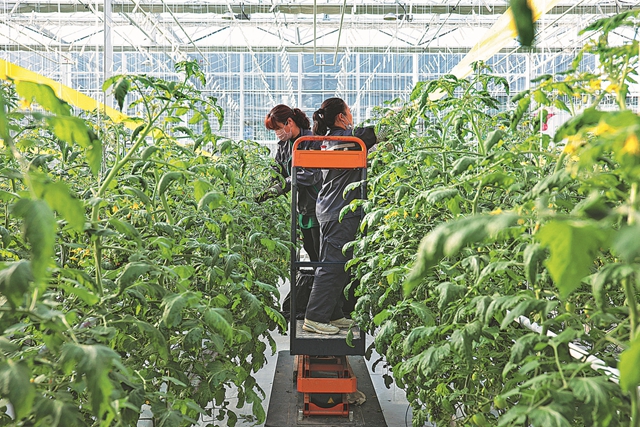Smart greenhouses boost yields
By ZHAO RUIXUE in Shouguang, Shandong| (China Daily)| Updated : 2022-07-21
Print Print
Workers tend crops at a greenhouse in Shouguang, a county-level city in Shandong province. WANG QUANGUO/FOR CHINA DAILY
Modern facilities are helping to raise output and provide better lives for people in East China
Along with two workers he employs from his village, Sun Zhenxing, 35, a farmer in Shouguang, Shandong province, operates four greenhouses that cover 4 hectares in total.
With each being 260 meters long and 40 meters wide in Dongzhenguan village, Sun's greenhouses are home to 65,000 colorful pepper plants, which can bring him an annual income of 1 million yuan ($148,000).
At a cost of 500,000 yuan each, the facilities feature smart devices, including an all-in-one machine that uses automation to adjust the amount of sunshine, water and fertilizer, as well as systems that control humidity and temperatures in the greenhouses.
"Unlike our parents, who relied completely on the weather and human labor to grow vegetables, we are growing them with technology," Sun said.
Since 1989, when the first batch of greenhouses were built in Shouguang, the city's vegetable cultivation sector has burgeoned, gaining recognition nationwide as China's main vegetable production and trading base.
Greenhouses now cover a combined 40,000 hectares in Shouguang, producing 4.5 million metric tons of vegetables annually, according to the city government.
Over the past three decades, growers have updated the greenhouses to better use the land and raise output, thus achieving higher profits.
Smart greenhouses account for 90 percent of the total number of newly built greenhouses in Dongzhenguan village.
"Thanks to the state-of-the-art greenhouses, a single pepper now weighs about 300 grams, 20 percent heavier than before," said Yin Chengyou, a member of the village Party committee.
Sun said, "Our peppers not only look good in terms of color and size, but they also taste good, which makes our products competitive in the marketplace."
Peppers grown in the village are sold in markets overseas, such as Russia, Kazakhstan and Singapore.
The vegetable business has encouraged hundreds of young people to return to the village to start their own businesses, according to Li Xinsheng, Party secretary of the village.
"The young people are more creative, and they are not only quick to master how to use technologies to grow vegetables, but are also good at marketing," he said.
Like Dongzhenguan, which focuses on peppers, many villages in Shouguang have cultivated their own focus on greenhouse produce, such as tomatoes, celery and cucumbers, making fresh vegetables available the whole year.
At Qiantuan village, which is known as a home of tomatoes for its rich varieties and quality produce, spacious greenhouses equipped with smart systems provide good opportunities for young people to start businesses.
Hu Zengxin, 34, and his wife have built five high-quality greenhouses in the past five years. In addition to two older ones built by Hu's parents, the couple now manage seven greenhouses, covering 3 hectares in total.
In the busiest season, they employ two workers to help them pick the tomatoes, but most of the time they are able to tend the greenhouses on their own, thanks to the automated devices fitted in their greenhouses.
Shouguang has formed a complete vegetable industry chain, covering seed research and development, seedling cultivation, planting management, processing and marketing, which provides more jobs for young people.
It has also independently developed and cultivated 160 varieties of vegetable seeds, and the city is able to cultivate 1.8 billion seedlings each year, generating total revenue of 1 billion yuan so far.

 Xi's Moments
Xi's Moments  Shandong gains remarkable results in promoting high-quality development
Shandong gains remarkable results in promoting high-quality development  2025 National Two Sessions
2025 National Two Sessions